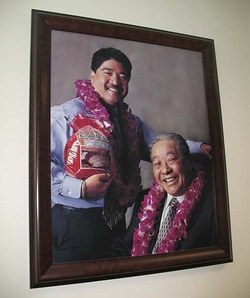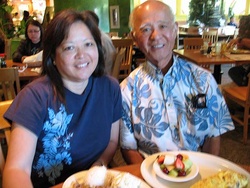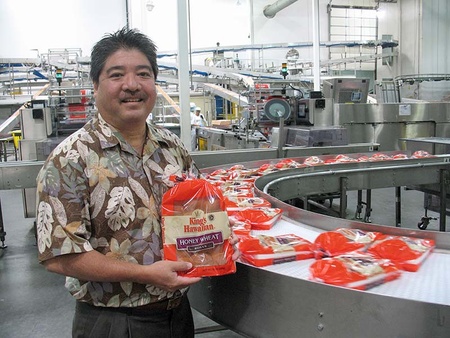Blending deep into the market
Ramen, tofu, soy sauce, miso—though there are many types of food that are associated with Japanese origins, not many Americans know that the King’s Hawaiian brand is also a Japanese American company. In a way, this serves as proof of how well the King’s Hawaiian sweetbread has blended into the American market over the years.

The father-son portrait on the wall of Mark’s office. Mark’s own two children also work at the company.
King’s Hawaiian got its start when Robert Taira—a Nikkei-Okinawan Nisei from Hilo, Hawaii—opened his own bakery upon graduating from bread making school. With a sweetness and softness that faintly spreads throughout one’s mouth, Robert’s bread—rumored to make a repeat customer out of anyone after trying it once—took the Hawaiian Islands by storm. He soon moved out of Hilo, and his new bakery in Honolulu flourished.
Robert, however, was not about to settle for his success on the islands alone. After all, there was a limit to the market in Hawaii. He desperately wanted to expand his business to the mainland.
In order to do so, he left his family behind in Hawaii and moved alone to California in the late 1970s. The franchise’s second-generation owner—Robert’s son, Mark—shared the story behind his father’s struggles early on:
“My father aggressively marketed his product to several distributors, but in the beginning nobody took him seriously. This was because at the time there was no such thing as sweetbread being sold. He repeatedly had doors closing in front of his face; but one day, after my father visited another company, he left a loaf of bread with the secretary before going home. The secretary, after taking one bite of the bread, was instantly drawn to its flavor and decided to make arrangements for a meeting with the company president. That’s how he began to receive callbacks from the distributors.”
The taste of the bread itself served as the vehicle that helped spread the word about his business.
The power of a Single Product
When asked, “What do you think is the secret behind the success of King’s Hawaiian bread?” Mark declared: “It’s the allure of sweetbread itself.” While business opportunities were denied due to the lack of product variety at first, it was this “Single Product”—one in which the founder poured his soul into—that eventually turned out to be the breakthrough solution.
This goes to show the type of unwavering confidence that Robert had in his sweetbread. “To this day, we still use the same high-quality butter, eggs, and flour used when the company was founded. We don’t take any shortcuts,” says Mark. True to his word, the original recipe has been faithfully inherited.
Even after deciding to incorporate machines in the production process, Mark proudly explained that these machines were custom made to make sure they produce bread that is equivalent in quality to a handmade loaf.
In addition to the Torrance factory located in the outskirts of Los Angeles County, a newer, 150,000 square foot factory (also located in Torrance) is occupied by machines that produce 4000 pounds of bread every hour. Ultimately, the products find their way into storefronts of major supermarkets across the entire country. They are even delivered to America’s largest grocery retailer, Walmart. In order to keep up with the growing demand, the company is planning to open a new factory this October in Gainesville, Georgia.
The Aloha Spirit and a family in solidarity
While there is no doubt that the most vital factor leading to King’s Hawaiian’s success was the power of the product itself, another important factor has been the “Aloha Spirit.”
The sweet smell of sweetbread hangs over the factory grounds. The workers are filled with kind-hearted smiles and a comfortable Hawaiian feel. It is the same type of atmosphere that one can experience at their King’s Hawaiian Restaurant.
Mark’s younger sister, Stella Miyamura, operates the King’s Hawaiian Restaurant, also located in Torrance. “When my father came to Los Angeles, when nobody knew about our product, the Okinawan community really came to our support,” says Stella. Key among those supporters was Willie Tokishi—a special consultant at Honda Motors America and one of the greatest benefactors to the Taira family. Willie introduced many of his acquaintances to Robert, and he personally spread the word around about the bread. “What he did for us at the time was something extremely special to us,” recalls Stella and Mark, as they both still speak fondly of Willie’s contributions to this day. On the other hand, with a warm smile across his face, Willie mentions: “You know how a lot of people forget about the kindness they’ve received on their way to becoming successful? Well, these folks [the Taira family] have a warm heart that will forever remember to share their feeling of gratitude.”
The second-generation, taking over from the charismatic founder
To be honest, before meeting Mark, I had one simple question in my head that I wanted to ask: Did he have any reservations about taking over his father’s successful business? Was there something else that he wanted to do?
Without hesitation, Mark replied, “I’ve grown up in a bakery since I was a child; I helped at the bakery during my years in school, and I always felt that it was a given fact that I would be involved with the family business as soon as I graduated.”
“So what was your father like as a businessman?” I asked. “He was utterly fearless. He was not the type to settle on momentary success. Even as the company was starting to grow, he did not grow complacent—he would go on to look for ways to improve the efficiency of production; he was always working on a new task or challenge,” answered Mark.
In his answer, I sensed a deep feeling of respect that Mark held toward the company’s charismatic founder. In fact, Robert Taira the businessman was a trailblazer of sorts, bringing his Hawaiian business over to the mainland and achieving great success.
However, regretfully, Robert passed away at the age of 79 in 2003, a year before the construction of the newer factory was to be completed. Today, a smiling portrait of a father and son can be found hanging on the wall in Mark’s office. The sweetbread is resting securely in the son’s arms.
© 2011 Keiko Fukuda







